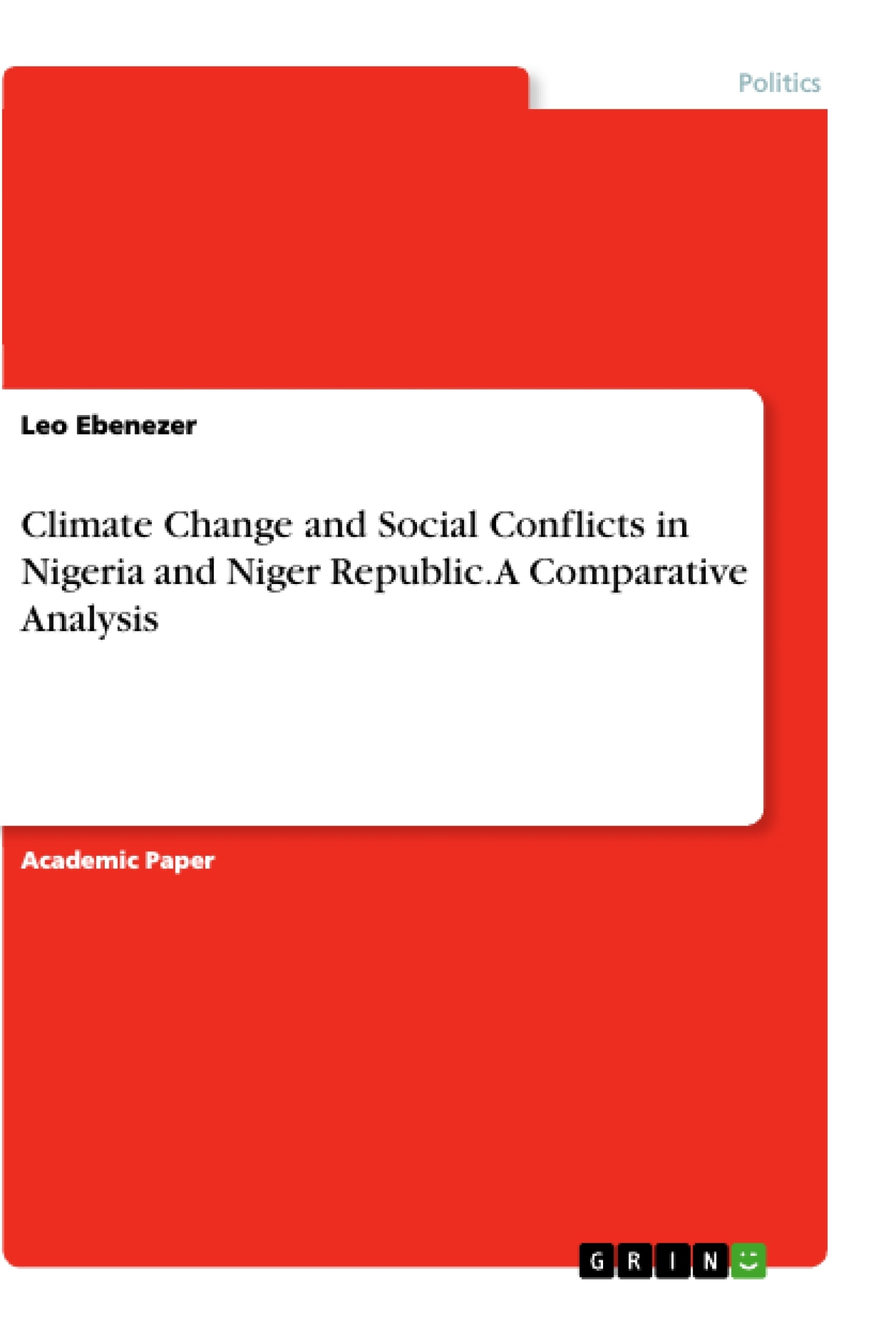This research examines the impact of climate change on societal conflict in Nigeria and Niger Republic. The objectives are to determine the impact of climate change on social conflict in Nigeria and Niger Republic; identify the progenitors and victims of climate change in Nigeria and Niger Republic; examine citizens’ perceptions on nationalist identities; and proffer solutions through mitigation and adaption strategies for mutual interdependence.
Two key areas of conflict necessitated this research. First, subnational agitations for environmental protection arising from environmental degradation, pollution, gas flaring, biodiversity depletion and destruction of the aquatic habitat which tends to undermine national unity. Second, farmers/herders clashes occasioned by deforestation and desertification of the Sahel region and the Lake Chad basin which undermine national security, peace and sustainable development in both countries. The anger of nature (astronomical) against humans (anthropogenic) on its endowments, and the reactive consequences of nature on how human beings and their agents have abused and destroyed the material/mineral resources freely provided by nature for man’s economic and social sustainability when not addressed drastically would negatively impact on subnational and interstate disharmony. The social conflict analytical approach, the Social Conflict Theory and the Anthropogenic Global Warming Theory are used to theoretically justify potentials of these social conflicts in redirecting the narratives of national unity and ethnic identity in both countries. This study uses descriptive research design and content analysis. The data employed for the study will be gathered from secondary sources. This work observed the devastating nature of social conflicts arising from climate change, especially in the Middle Belt in Nigeria, by headers/farmers crisis. It attributed it to lack of understanding, intolerance, accommodation and burden sharing. It enjoined citizens to stop religious and politicization of the crisis and give peace a chance for unity, solidarity and mutual co-existence in both countries.
Inhaltsverzeichnis (Table of Contents)
- INTRODUCTION - CHAPTER ONE
- 1.1 Background to the Study
- 1.2 Statement of Problem
- 1.3 Objectives of the Study
- 1.4 Research Questions
- 1.5 Significance of the Study
- CHAPTER TWO - LITERATURE REVIEW AND METHODOLOGY
- 2.1 Literature Review
- 2.1.1 Conceptual Literature Review
- 2.1.2 Theoretical Literature Review
- 2.2 Methodology
- CHAPTER THREE - DATA PRESENTATION AND ANALYSIS
- 3.1 Data Presentation
- 3.1.1 Impacts of Climate Change on Social Conflict in Nigeria and Niger Republic
- 3.1.2 Causes of Climate Change in Nigeria and Niger Republic
- 3.1.3 Climate Change Causalities (Victims) in Nigeria and Niger Republic
- 3.2 Discussion of Findings
- CHAPTER FOUR - SUMMARY, CONCLUSION AND RECOMMENDATIONS
- 4.1 Conclusion
- 4.2 Recommendations
Zielsetzung und Themenschwerpunkte (Objectives and Key Themes)
This study aims to analyze the relationship between climate change and social conflicts in Nigeria and Niger Republic. The study seeks to understand the specific impacts of climate change on social conflicts in these countries, the factors driving these conflicts, and the vulnerabilities of different groups to climate-induced challenges. The analysis will be conducted using a comparative approach, considering both countries' distinct contexts and shared vulnerabilities to climate change.
- Impact of Climate Change on Social Conflict in Nigeria and Niger Republic
- Causes and Triggers of Climate Change in Both Countries
- Vulnerability of Different Groups to Climate Change Impacts
- Comparative Analysis of the Nexus between Climate Change and Social Conflicts
- Strategies for Addressing the Impacts of Climate Change and Mitigating Social Conflicts
Zusammenfassung der Kapitel (Chapter Summaries)
- INTRODUCTION - CHAPTER ONE: This chapter establishes the context for the study by exploring the relationship between climate change and social conflicts in Nigeria and Niger Republic. It highlights the vulnerability of these countries to climate change impacts and the potential for conflict escalation. The chapter also outlines the research questions, objectives, and significance of the study.
- CHAPTER TWO - LITERATURE REVIEW AND METHODOLOGY: This chapter delves into existing literature on climate change and social conflict, providing a theoretical framework for the study. It also examines the methodology used to collect and analyze data for the study.
- CHAPTER THREE - DATA PRESENTATION AND ANALYSIS: This chapter presents the findings of the study. It explores the impacts of climate change on social conflicts in Nigeria and Niger Republic, identifies the causes of climate change in both countries, and examines the vulnerability of different groups to climate change impacts.
Schlüsselwörter (Keywords)
This study focuses on climate change, social conflicts, vulnerability, comparative analysis, Nigeria, Niger Republic, Lake Chad Basin, environmental degradation, resource scarcity, conflict triggers, mitigation strategies, adaptation measures, and intergroup relations.
Frequently Asked Questions
How does climate change trigger social conflict in Nigeria and Niger?
Climate change leads to environmental degradation, deforestation, and the shrinking of the Lake Chad Basin, which forces herders and farmers into direct competition for scarce resources like water and land.
What is the "Social Conflict Theory" in this context?
It is a theoretical framework used to justify how environmental pressures redirect narratives of national unity and ethnic identity, often leading to disharmony between different groups.
Who are the primary victims of climate-induced conflicts in these regions?
The primary victims are rural populations, specifically farmers and herders in the Sahel region and the Middle Belt of Nigeria, who lose their livelihoods and security due to the "anger of nature."
What role does the Lake Chad Basin play in regional stability?
The basin is a vital resource for millions. Its depletion due to climate change undermines sustainable development and fuels subnational agitations and interstate conflicts.
What solutions are recommended to mitigate these conflicts?
The study recommends mitigation and adaptation strategies based on mutual interdependence, burden sharing, and stopping the politicization or religious framing of environmental crises.
- Quote paper
- Leo Ebenezer (Author), 2021, Climate Change and Social Conflicts in Nigeria and Niger Republic. A Comparative Analysis, Munich, GRIN Verlag, https://www.grin.com/document/1126324



